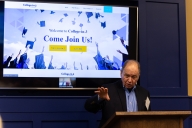You have /5 articles left.
Sign up for a free account or log in.
A national accreditor at the center of the collapse of two for-profit college chains got another lease on life after a court ruling kicked back to the Department of Education a 2016 decision withdrawing federal recognition and, later, the Trump administration restored that recognition pending further review.
Even with another shot at restoring federal recognition, though, the long-term outlook for the Accrediting Council for Independent Colleges and Schools remains murky.
ACICS oversaw Corinthian Colleges, which collapsed in 2015, and ITT Technical Institute, which closed its 130 campuses in 2016. The Obama administration subsequently took the unprecedented step of withdrawing federal recognition of the accreditor, setting off a scramble for its nearly 270 colleges to find a new home.
Recent analyses have shown that by this point all but a handful of ACICS colleges have taken steps to find new accreditation -- either receiving approval from another organization, filing an application for recognition elsewhere or finding themselves at some point in the process.
ACICS in the final years of the Obama administration became a bellwether for how the federal government would hold the for-profit college sector accountable for poor outcomes for students -- or outright fraud and abuse, as documented at many Corinthian campuses. The agency's potential return has likewise been seen by many as evidence of a more lax approach to the sector by Education Secretary Betsy DeVos -- or a more fair one, as critics of the previous administration view it.
After the decision by District Court Judge Reggie Walton, the Department of Education will be tasked with reviewing additional documents that the judge found were improperly overlooked in 2016. And the order issued by DeVos last week laid out additional details for that review process that will mean the accreditor must meet fewer requirements before accreditation is restored.
But some higher education observers believe that even if the department ultimately restores the accreditor’s recognition, it won’t be around for the long haul. That skepticism is due to the number of colleges that have already made moves to depart ACICS and to the damage the accreditor's brand has sustained as regulators have scrutinized its failures in oversight.
“I think that ACICS is too far gone at this point,” said Robert Kelchen, an assistant professor higher education at Seton Hall University who studies education finance and accountability.
Kelchen said ACICS will not only have to persuade colleges to stop leaving for other accreditors -- it will have to attract new schools. The loss of membership dues from institutions that have already departed will have long-term consequences for the organization’s financial health, he said.
After its recent troubles with the federal government, some institutions seeking accreditation may also be scared off by uncertainty surrounding ACICS, Kelchen said.
“I don’t see colleges being willing to take that risk at this point,” he said.
A February analysis from the Center for American Progress found that just 19 institutions accredited by ACICS had not taken any steps to be recognized by another accreditor. Twenty-six had already been approved elsewhere and another 118 are somewhere in the process of review by a new accreditor but haven’t gotten full approval.
A handful of institutions are also in the process of being acquired via merger by already accredited higher ed institutions.
The order issued by DeVos last week said the department would review the status of ACICS based on its original 2016 application for renewal, rather than its 2017 appeal of the department’s decision. That means a less strenuous process with fewer requirements to be recognized. The DeVos order also threw out an 18-month timeline originally set by the department for other ACICS institutions to find recognition elsewhere before they lose access to federal aid.
Michale McComis, executive director of the Accrediting Commission of Career Schools and Colleges, said his organization expected to process 95 percent of applications from former ACICS schools by the original June deadline to maintain Title IV eligibility.
After its fellow accreditor originally lost federal recognition, ACCSC added substantial resources in anticipation of a number of programs hoping to be recognized. His organization’s primary interest, McComis said, was ensuring that access to Title IV federal aid wasn’t interrupted for the thousands of students enrolled in those programs.
“We weren’t looking to accommodate the schools,” he said. “Students were the primary consideration.”
There is a large overlap between the kinds of colleges overseen by both accreditors -- including many career programs training students for jobs like medical assistant or dental hygienist. And McComis said that applications from former ACICS schools have been treated the same as those from anywhere else.
The review process has ranged widely for each program, he said. Some sailed through to approval while others have had final decisions deferred until they can meet additional benchmarks. The process also involved a fair number of rejections in a prescreening process, McComis said. Those that failed to advance past that stage were typically either under investigation or sanction by regulators or had stressed financial conditions.
He said “just a couple” institutions had notified ACCSC since DeVos issued her order that they would not continue with the accreditation process.
Trace Urdan, an analyst who follows the for-profit education sector at Tyton Partners, said he thinks it’s unlikely that more colleges abandon the process of accreditation elsewhere to stick with ACICS. That’s in large part because it’s not in those colleges’ competitive interest to do so, he said, as rival institutions have used their struggles at the federal level for negative recruiting purposes.
“They’ll use that when they’re talking to prospective students who may be looking at an ACICS school,” he said. “They have political and regulatory risk that could resurface in the event an administration changes.”
If ACICS is forced to raise its standards to get restored recognition, he said, that would also erase any advantage from sticking with them over another oversight body with a stronger reputation, Urdan said. The court ruling and decision from DeVos are basically a reprieve for colleges still recognized by the accreditor, he said.
But Antoinette Flores, a senior analyst of postsecondary education policy at the Center for American Progress, said it’s too soon to count the accreditor out.
Although only a handful of institutions haven’t yet applied elsewhere, there are well over 100 colleges that have not yet been approved by other oversight bodies, she said.
“It’s not certain that they would be approved by another accrediting agency,” Flores said.
Another point in ACICS’s long-term favor, she said, is that a number of institutions it oversees don’t receive Title IV funds. That means their revenue isn’t affected by their accreditation status -- and they will continue to pay membership dues to the organization.
Flores said the uncertainty surrounding ACICS thanks to the long battle to sustain its federal recognition makes it likely that many schools will continue pursuing accreditation elsewhere. But there are realistically a fair number of schools that won’t meet the requirements elsewhere, she said.
Some of those colleges may see fewer incentives for seriously improving on standards if the accreditor sticks around, Flores said.
“The urgency has gone away,” she said.








